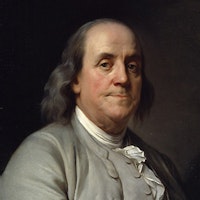And the longer I live the more convincing proofs I see of this truth, that God governs in the affairs of men…. The sacred texts declared that “except the Lord build the house, they labor in vain that build it.”
And the longer I live the more convincing proofs I see of this truth, that God governs in the affairs of men…. The sacred texts declared that “except the Lord build the house, they labor in vain that build it.”
Benjamin Franklin

God Governs
Topic: Justice, Vision, & Leadership
Our prayers were heard, sir, and they were graciously answered. All of us who were engaged in the struggle must have observed the frequent instances of a superintending Providence in our favor…. And the longer I live the more convincing proofs I see of this truth, that God governs in the affairs of men. And if a sparrow cannot fall to the ground without his notice, is it probable that an empire can rise without his aid? The sacred texts declared that “except the Lord build the house, they labor in vain that build it.” I firmly believe this.
Benjamin Franklin FRS FRSE (January 17, 1706 - April 17, 1790) was an American polymath and one of the Founding Fathers of the United States. Franklin was a leading author, printer, political theorist, politician, freemason, postmaster, scientist, inventor, humorist, civic activist, statesman, and diplomat. As a scientist, he was a major figure in the American Enlightenment and the history of physics for his discoveries and theories regarding electricity. As an inventor, he is known for the lightning rod, bifocals, and the Franklin stove, among other inventions. He founded many civic organizations, including Philadelphia's fire department and the University of Pennsylvania.
Constitutional Convention 1787
Brands, H. W. The First American: the Life and Times of Benjamin Franklin. Anchor Books, 2002, p. 678 [Benjamin Franklin, Constitutional Convention 1787].

Benjamin Franklin
Theme: A Vision of America

About This Benjamin Franklin Quotation [Commentary]
Benjamin Franklin, Constitutional Convention 1787
Resources
Related Quotes
Copyright © 2017 – 2026 LuminaryQuotes.com About Us